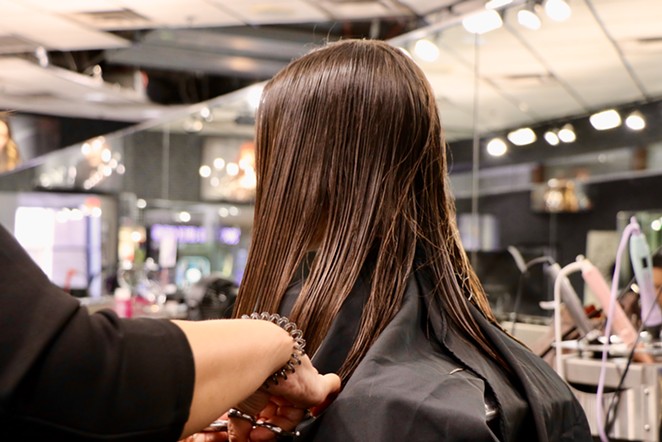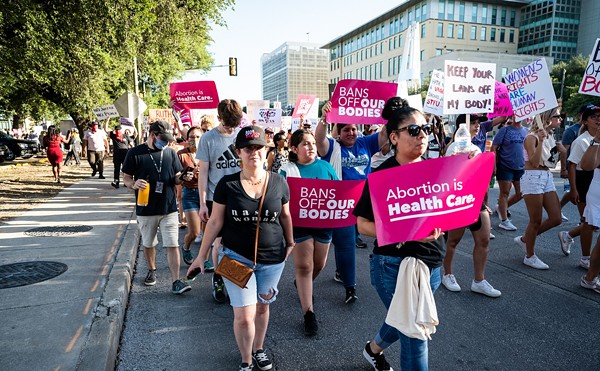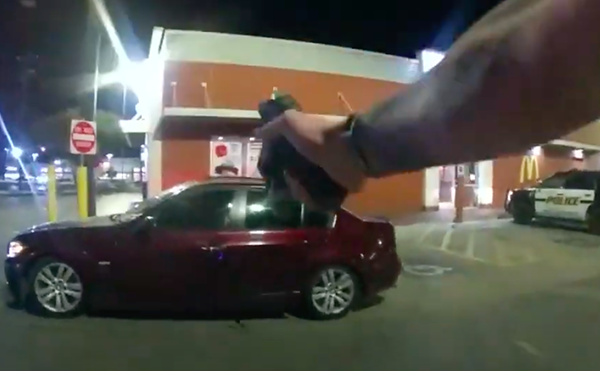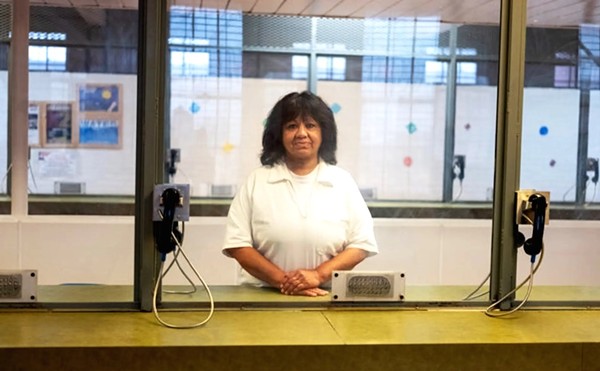Cutting It Close: Facing Loss of Income, San Antonio Salon Workers Keep Up Risky Work Amid Pandemic
By James Dobbins on Wed, Mar 25, 2020 at 10:19 am
We’ve known for nearly two months that COVID-19 presents a threat to San Antonians. Last week, gyms, theaters, schools, bars, restaurants and other non-essential venues were closed by decree too late to halt community spread.
But the belated actions taken by the city government appear to have left one vulnerable group behind: salon workers.
At North Star and La Cantera malls, Visible Changes — a chain of 17 salons owned by the McCormack family of Houston — hair washers and stylists continued to come in close contact with the public over the weekend.
On Saturday, roughly 25 employees served clients at both locations. Mary Sonnier, a commission-based hairstylist at Visible Changes’ North Star location, said she told the owners she was scared of working during the pandemic.
“The McCormacks told us they are looking out for us, because we are commission workers,” Sonnier said. “They want to stay open so we can make what we can while we can. At the same time, we are at high risk.”
At press time Monday, no one at Visible Changes’ corporate office returned phone inquiries about the shops remaining open. However, a shelter-in-place order from the city and Bexar County seems imminent.
Visible Changes’ owners told employees they don’t have to come to work if they felt uncomfortable, according to workers interviewed by the Current. Still, the company wouldn’t pay for the time off if they chose to stay home, leaving a choice between zero income or possible exposure to the novel coronavirus.
“It’s a rock and hard place,” Sonnier said. “I have two people at home who have auto-immune diseases, and they are on immunosuppressants. If I contract something and bring it home to them, it would be harder for them to fight it off.”
Sonnier’s recent clients — fewer in numbers these days — included four healthcare workers. One even arrived in her scrubs after a hospital shift. All work in hospitals seeing coronavirus patients, she added.
Another client, a doctor, took responsibility and canceled all her future appointments.
“We wish everyone was that way,” Sonnier said. “But there are other people not taking it as seriously, and they are putting us at risk.”
Sonnier said her weekly commissions have decreased 80% since the start of the pandemic. Since she works on commission, she also covers her own health insurance premiums and is unsure whether she’s eligible for unemployment benefits.
Workers at the salon said Visible Changes’ management told them they were keeping the salons open to avoid paying “dark rent” — money the company would hand over to the malls if the storefronts closed.
On visits to North Star and La Cantera last weekend, Visible Changes had the only open storefronts. The malls were surreally desolate, with only a handful of staff wiping down surfaces.
At other salon chains, the managers continue business as usual.
At Salons by JC, a few dozen professionals continued to work inside a labyrinth of single-room barbershops and stylist shops in an Alamo Heights strip mall. On Saturday, a week after Mayor Ron Nirenberg urged citizens to go out and shop local, I spoke to Nasrin, an independent hairstylist and Salons by JC lessee. She chose not to reveal her last name.
She’s had no customers for the past seven days, yet she continues to show up because she owes $242 in weekly rent. Salons by JC also did not return calls for comment.
“I am the only one who is bringing money into [my] house,” Narsin said. “I support six people.”
Jennifer Delgado, another independent stylist with a Salons by JC suite, questions where the line is for workers like herself who must be in contact with clients.
She and her partner have decided to close. As a grandmother, she worries the risks are no longer worth the potential income.
Though the Small Business Administration is offering emergency loans to owner-operators such as Nasrin and Delgado, both women doubt they’ll apply. Without customers, how can they repay the debt?
At 73, Mary Alice Medina, stylist and owner of San Antonio salon Angeline De Carlo, stepped away from cutting hair at the urging of her children. Some of the independent stylists at her business continued over the weekend to see the few clients still making appointments. Others have temporarily quit.
Salon workers are educated in the dynamics of infectious diseases. Frequent classes on sanitation are part of the licensing requirements.
“The workers wear masks, the clients wear masks, everyone uses hand sanitizer,” Medina said of the steps taken at her own salon. “After every client, we spray the chair with bleach. Once we’re ordered to close, we will close.”
Mayor Nirenberg, who spent Saturday night posting his favorite music on Instagram as the city he represents faces rapid coronavirus community spread, was unavailable for comment on this story. Salon workers begged him for help on his Instagram posts.
Local workers in the beauty industry say they’re losing hope employers and politicians care about the risks they face.
“I just wish the president started this a lot sooner,” Medina said. “I’ve worked in this industry for 55 years and I’ve never seen anything like this.”
Stay on top of San Antonio news and views. Sign up for our Weekly Headlines Newsletter.
But the belated actions taken by the city government appear to have left one vulnerable group behind: salon workers.
At North Star and La Cantera malls, Visible Changes — a chain of 17 salons owned by the McCormack family of Houston — hair washers and stylists continued to come in close contact with the public over the weekend.
On Saturday, roughly 25 employees served clients at both locations. Mary Sonnier, a commission-based hairstylist at Visible Changes’ North Star location, said she told the owners she was scared of working during the pandemic.
“The McCormacks told us they are looking out for us, because we are commission workers,” Sonnier said. “They want to stay open so we can make what we can while we can. At the same time, we are at high risk.”
At press time Monday, no one at Visible Changes’ corporate office returned phone inquiries about the shops remaining open. However, a shelter-in-place order from the city and Bexar County seems imminent.
Visible Changes’ owners told employees they don’t have to come to work if they felt uncomfortable, according to workers interviewed by the Current. Still, the company wouldn’t pay for the time off if they chose to stay home, leaving a choice between zero income or possible exposure to the novel coronavirus.
“It’s a rock and hard place,” Sonnier said. “I have two people at home who have auto-immune diseases, and they are on immunosuppressants. If I contract something and bring it home to them, it would be harder for them to fight it off.”
Sonnier’s recent clients — fewer in numbers these days — included four healthcare workers. One even arrived in her scrubs after a hospital shift. All work in hospitals seeing coronavirus patients, she added.
Another client, a doctor, took responsibility and canceled all her future appointments.
“We wish everyone was that way,” Sonnier said. “But there are other people not taking it as seriously, and they are putting us at risk.”
Sonnier said her weekly commissions have decreased 80% since the start of the pandemic. Since she works on commission, she also covers her own health insurance premiums and is unsure whether she’s eligible for unemployment benefits.
Workers at the salon said Visible Changes’ management told them they were keeping the salons open to avoid paying “dark rent” — money the company would hand over to the malls if the storefronts closed.
On visits to North Star and La Cantera last weekend, Visible Changes had the only open storefronts. The malls were surreally desolate, with only a handful of staff wiping down surfaces.
At other salon chains, the managers continue business as usual.
At Salons by JC, a few dozen professionals continued to work inside a labyrinth of single-room barbershops and stylist shops in an Alamo Heights strip mall. On Saturday, a week after Mayor Ron Nirenberg urged citizens to go out and shop local, I spoke to Nasrin, an independent hairstylist and Salons by JC lessee. She chose not to reveal her last name.
She’s had no customers for the past seven days, yet she continues to show up because she owes $242 in weekly rent. Salons by JC also did not return calls for comment.
“I am the only one who is bringing money into [my] house,” Narsin said. “I support six people.”
Jennifer Delgado, another independent stylist with a Salons by JC suite, questions where the line is for workers like herself who must be in contact with clients.
She and her partner have decided to close. As a grandmother, she worries the risks are no longer worth the potential income.
Though the Small Business Administration is offering emergency loans to owner-operators such as Nasrin and Delgado, both women doubt they’ll apply. Without customers, how can they repay the debt?
At 73, Mary Alice Medina, stylist and owner of San Antonio salon Angeline De Carlo, stepped away from cutting hair at the urging of her children. Some of the independent stylists at her business continued over the weekend to see the few clients still making appointments. Others have temporarily quit.
Salon workers are educated in the dynamics of infectious diseases. Frequent classes on sanitation are part of the licensing requirements.
“The workers wear masks, the clients wear masks, everyone uses hand sanitizer,” Medina said of the steps taken at her own salon. “After every client, we spray the chair with bleach. Once we’re ordered to close, we will close.”
Mayor Nirenberg, who spent Saturday night posting his favorite music on Instagram as the city he represents faces rapid coronavirus community spread, was unavailable for comment on this story. Salon workers begged him for help on his Instagram posts.
Local workers in the beauty industry say they’re losing hope employers and politicians care about the risks they face.
“I just wish the president started this a lot sooner,” Medina said. “I’ve worked in this industry for 55 years and I’ve never seen anything like this.”
Stay on top of San Antonio news and views. Sign up for our Weekly Headlines Newsletter.

KEEP SA CURRENT!
Since 1986, the SA Current has served as the free, independent voice of San Antonio, and we want to keep it that way.
Becoming an SA Current Supporter for as little as $5 a month allows us to continue offering readers access to our coverage of local news, food, nightlife, events, and culture with no paywalls.
Scroll to read more San Antonio News articles
Newsletters
Join SA Current Newsletters
Subscribe now to get the latest news delivered right to your inbox.

















